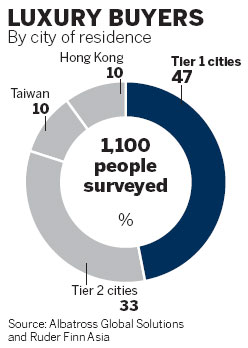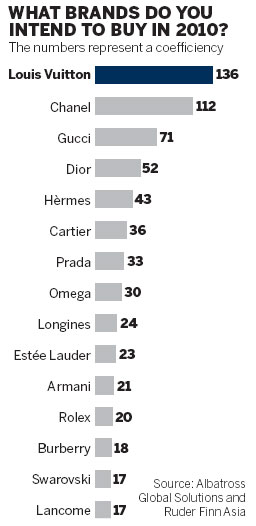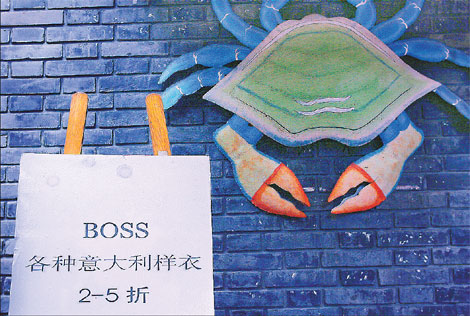Luxury products win mass appeal
|
A board advertising Hugo Boss clothes at a discount rate of between 50 and 80 per cent in Binhu Street, Hangzhou, Zhejiang province, where hundreds of international clothes brands have opened outlets. Bao Zunyuan / China Foto Press |
Expensive brands in danger of losing their exclusivity
BEIJING - Luxury brand makers are struggling to find the right sales strategy in China after the country was named the second largest market in the sector.
Debate is raging over whether to maintain their exclusivity or to allow them to become more commonplace.
The Japanese lead the field in terms of luxury goods purchases. The Chinese follow, spending $9.4 billion in 2009, accounting for 27.5 percent of total global sales. The United States is in third place.
"For traditional luxury goods brands, there are two directions," said Denis Morisset, a director at Ecole Superieure des Sciences Economiques et Commerciales (ESSEC). "One is the elite path. The other seeks popularity among ordinary consumers. At present, no obvious barrier exists between these two directions."
Hermes, for the first time in the brand's history, is set to launch a new brand called Shang Xia in China this fall. According to the company, the first Shang Xia store will be opened in Shanghai selling tableware and furniture. The products' design, brand management and craftsmanship would be localized with Chinese characteristics built into the brand for Chinese consumers.

Some analysts believe Shang Xia products would be cheaper than the company's main brands because of their localization, but may dilute the Hermes name, which is famously attached to its Kelly and Birkin bags which retail at $10,000 to $60,000.
However, the Financial Times quoted Florian Craen, Hermes managing director in north Asia, as saying that while Hermes was a Parisian company, Shang Xia would be completely different.
While top-tier shopping malls are mostly situated in Beijing's central business district, there is a luxury goods outlet called Beijing Scitech Premium Outlet Mall in the suburbs near the airport which attracts many Chinese customers because it offers high-end brands at discount prices.
One of the shops at the discount mall, Coach, offers a 30 percent discount on new handbag collections and also some off-season products at special prices around 2,000 yuan. Major products are priced between 2,000 and 7,000 yuan in the store. The sales volume of the store is around 300,000 yuan per day.
There are more than 20 stores selling international brands in the mall, including Burberry, Ports, Dunhill, Bally, CK and Puma.
Zhou Mi, a 26-year old student at a Parisian business school, who is spending his summer holiday in Beijing, said: "It's totally different from the outlet in France. The outlet near Paris only sells luxury brands rather than CK products, which are very common in Europe."
Luxury goods consumers in China are younger than their counterparts in Western countries and Japan. According to research by Ipsos France, most consumers of luxury goods in China are aged between 25 and 40 with monthly salaries between 5,000 and 50,000 yuan.
"As more and more young Chinese people can afford global luxury goods, today's luxury goods are becoming tomorrow's necessities," said Zhu Mingxia, director at Cheungken Research Center for Luxury Goods and Services, part of the University of International Business and Economics.
However, Morisset at ESSEC is worried about the future of global luxury brands. He said that the larger the sales volume, the more profit the company makes. However, the exclusivity of luxury goods would disappear as more and more people owned them.
To maintain their cachet, Morisset said a unique service should be provided to their VIP customers.
Laurent Schenten, director of the International Customer Division at Printemps, a top-tier shopping mall in Paris, agreed with Morisset.
"The real luxury aspect is not limited to the product itself. The notion of service and shopping environment are also very critical," Schenten told China Business Weekly.

Since 2007, Printemps has sought to improve its shopping environment. The mall refurbished its historical facade. For Chinese clients, they created guest relation services, hands-free shopping and personal shoppers.
This year, Printemps will launch a Chinese version of its website to help Chinese customers to prepare before visiting the mall.
"The pleasure of being and buying in Paris is very significant for Chinese customers. They are happy to share their unique travel and shopping experiences with friends and family," said Schenten.
According to Printemps, 30 percent of a typical Chinese tourist's travel budget goes on shopping. In the first half of this year, Chinese customers spent an average of 1,750 euros each in the mall, 13 percent higher than the same period last year.
Schenten also said that shopping represented one of the most important activities for Chinese customers while traveling. For US tourists in the French capital, food is one of the main attractions.
The Chinese not only buy for themselves; they also buy gifts for family, friends and colleagues.
Zhang Yanqi, a 33-year old Chinese entrepreneur who has just returned from a fruitful trip to Paris, said: "I bought five Louis Vuitton purses for my friends as gifts. They will be very happy," he said.
Wang Yun, a 22-year old human resources officer with an overseas company, was surprised to see a Cartier ring on the Kaixin 001.com social networking website. "I was surprised to see Kaixin having advertisements for luxury goods such as Cartier. I like the ring very much and I want to buy it," she said, while worrying about the cost.
Wang is not unusual. An increasing number of Chinese people, including white-collar workers and other middle-class groups, are buying luxury goods to reward themselves.
As a result, many traditional luxury brands are changing their business strategies to lure them, eschewing exclusivity and welcoming the new source of income.
During the Shanghai 2010 Expo, France, the country famous for its luxury goods, erected a luxury goods store near the country's pavilion. Unlike the boutiques selling luxury brands in Beijing and Shanghai, where sales clerks wear classy uniforms and often look smarter than their customers, the expo store has a more relaxed atmosphere. As well as stocking several expensive French perfumes, it sells one at what many consider to be a reasonable 188 yuan.
Chanel and Prada also launched special products in connection with the expo. One of Chanel's is a handbag shaped like a Chinese food takeaway carton.
China Daily

(China Daily 08/02/2010 page13)















